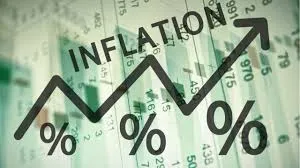Food Inflation: Nigerian households, businesses grapple with costs
Yemi Olarenwaju, a teacher and father of five, said his family now eats once a day to survive the harsh times. Living on a salary of N95,000, he ensures they eat one heavily balanced meal midday to cut expenses.;

The relentless surge in food prices has imposed a significant burden on Nigerian households and businesses alike.
Nigeria’s inflation rate increased from 33.95 percent in May 2024 to 34.19 percent in June 2024, according to the National Bureau of Statistics (NBS) recently issued June Consumer Price Index (CPI) report.
The CPI measures the rate at which the prices of goods and services change.
The NBS reported that as food and non-alcoholic beverage costs continued to rise in June, food inflation also increased to 40.87 percent.
On a year-on-year basis, the headline inflation rate was 11.40 percent higher compared to June 2023, which recorded a rate of 22.79 percent.
Month-on-month, the headline inflation rate in June 2024 was 2.31 percent, 0.17 percent higher than the 2.14 percent rate recorded in May 2024.
“This means that in June 2024, the rate of increase in the average price level will be higher than in May 2024,” the bureau noted.
Some families and experts in the food industry shared their experiences with the newsmen on Sunday in Lagos.
Feyisayo Omon, a mother of five and a civil servant, said her family no longer eats three square meals a day and struggles to maintain a balanced diet.
“If I told you that we were a family that could get up any time of the day and be sure that food was in the kitchen, you wouldn’t believe me. There was always something to eat or something to snack on.
“But now, our fridge is almost useless, and our gas rarely feels the pot nowadays. It’s been tough. The price of food in the market makes me depressed,” Omon said.
Maria Ose, a mother of two, complained about the high cost of food and its impact on adequately caring for her children.
“Things have gotten worse in the past few years. When these children were little, I used to complain about the price of baby foods, SMA Gold, Cerelac, and all that. I thought it would be easier when they grow up, but it’s not true.
“When I go to the market to buy things for cooking, I shed tears because this is not how things used to be. Even if I carry N100,000 to the market, I don’t think I can buy something tangible for the family to eat for a month,” Ose lamented.
Yemi Olarenwaju, a teacher and father of five, said his family now eats once a day to survive the harsh times. Living on a salary of N95,000, he ensures they eat one heavily balanced meal midday to cut expenses.
“We can’t eat food for luxury at this time. So, we eat to survive, to fuel us to work. If things probably get better, we can move to eating more than once,” Olarenwaju explained.
Fatimah Eniola, CEO of Bint Cakes ‘n’ More, Lagos, decried low customer patronage in her business.
“People see eating out as a luxury now. The rising cost of food prices has made food service expensive,” she said, noting increased customer complaints as if they were oblivious to the country’s situation.
Eniola expressed hope that the government would intervene to help the food industry and struggling households.
Ms. Joy Onwumere, General Managing Director of Chefs Culinary Arts, said that food vendors find it difficult to do their costing and budgeting.
“Imagine if you had a client, and the price of the food they ordered triples in less than three days. What will you do? It’s terrible,” Onwumere said.
Onwumere added that medical professionals in the hospitality industry were losing some of their customers because of high charges when assessing their facilities.
“If you go to the market with N5,000, you might end up coming back without buying anything. You can’t even do your budgeting or costing because of the constant change in food prices.
“This has caused food hoarding and the sale of expired foods,” she said.
Onwumere explained that this had led to businesses closing down due to low liquidity and an inability to restock.
She narrated her personal experience of setbacks and how her customer base had dropped drastically due to price increases.
“Two weeks ago, I catered for an event for 400 people, and I didn’t make a profit because the cost of ingredients had risen significantly.
“Now, I can’t even tell clients to increase the money because I have given my quotation,” she explained.
Onwumere revealed that many hospitality institutions and food vendors had shut down.
According to him, even in the culinary school where she trains, students are not enrolling as they should because of the constant price increase of materials for practicals.
“Clients want the best but don’t want to pay higher prices because their salaries are not increasing. “So you keep on explaining, and if you are tired of explaining, what do you do? You pack up,” she said.
Onwumere encouraged Nigerians to go into subsistence farming to assist their families.
“I own a farm where I plant vegetables and rear chickens and turkeys. I advise other food vendors to do the same.

